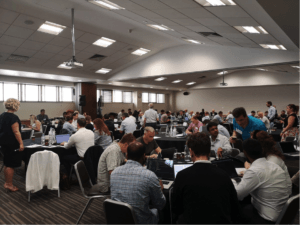The 3rd INTEROPen Hackathon took place on Thursday 27 June in central London in collaboration with the One London LHCR (Local Health and Care Record). The event had 110 attendees from 29 IT Vendors and software development shops from NHS organisations.
It was an outstanding event – valuable to both builders of software, LHCRs, the service as a whole and NHS Digital and NHSX.

Standard APIs suddenly makes everything possible
Compared to our previous struggles across the NHS, and even compared to the previous two Hackathons, having more standard APIs made interoperability far easier. It was remarkable what could be put together in a short period of time, proving what collaboration can really achieve.
To list all 14 examples built and shown on the day, in this one blog, would be impossible…particularly for me! Instead I am sharing the highlights that are really demonstrating the genuine change we are seeing and experiencing in interoperability right now.
- Sharing medication information between LHCRs built on different supplier platforms but using the same FHIR-based APIs
- Querying and showing medications and allergies information in one application from two GP systems using the exact same FHIR-based API
- Mobile application for glucose monitoring by patients integrating with a LHCRE platform using the standard FHIR-based API
- Showing how you can decouple Personal Health Records (PHRs) and allow vital signs information to be exchanged between two patient facing applications using standard FHIR-based APIs
- Reconciling medications between an EPR and LHCRE Platform in a GP Application using standard APIs
- Sharing Care Plan information between a GP System and PHR
- Sharing appointment information with a GP system that allows any third party system to interact with it and make an appointment using the standard FHIR-based API.
Previously the variability of end points and proprietary interfaces would have made these scenarios impossible, but yesterday these were successfully built.
More People Attended than Ever Before
Compared to the first hackathon participation has doubled with representation from both start-ups, SMEs and larger established players in the Healthcare IT Market. Proving again that having standard APIs motivates more organisations to want to, and can, make use of them. We reinforce the virtuous circle of continually growing the number of organisations who want to share and use data.
More Start-Ups and SMEs
I was astounded, and hugely encouraged, by just how many start-ups and new SMEs attended. All were driving real innovation – demonstrating how standard APIs are the secret to growing an eco-system of application providers. With a broader eco-system, we can support more innovation by unlocking data within applications and software vendors can compete on value, service etc. This is exactly what we need to encourage and enable new entrants to come into the Health IT market in England (and the UK).
The energy at the event was palpable – participants were all willing to collaborate which was both refreshing and, quite frankly, thrilling. It is everything INTEROPen has been working towards for the last two years. It also goes to prove, as said by NHSX CEO, Matthew Gould “With platforms, APIs (and consent), we can liberate the data and exciting things can happen”.
Yesterday we showed many exciting things that APIs can deliver at this third INTEROPen Hackathon with OneLondon LHCR. And my apologies to those not included above.
There are many many contributors to the increased success of these hackathons, but I’d like to take a moment to express my thanks for the amazing work completed behind the scenes. Thank you, Helen Young of INTEROPen, Kate Dawes and Neil Robinson of OneLondon for organising this event.
David Hancock, Vendor Co-Chair INTEROPen, Healthcare Executive Advisor - InterSystems

























